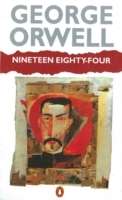Nineteen Eighty Four

Resumen del libro
Purchase one of 1st World Library's Classic Books and help support our free internet library of downloadable eBooks. Visit us online at www.1stWorldLibrary.ORG - - It was a bright cold day in April, and the clocks were striking thirteen. Winston Smith, his chin nuzzled into his breast in an effort to escape the vile wind, slipped quickly through the glass doors of Victory Mansions, though not quickly enough to prevent a swirl of gritty dust from entering along with him.
The hallway smelt of boiled cabbage and old rag mats. At one end of it a coloured poster, too large for indoor display, had been tacked to the wall. It depicted imply an enormous face, more than a metre wide: the face of a man of about forty-five, with a heavy black moustache and ruggedly handsome features.
Winston made for the stairs. It was no use trying the lift. Even at the best of times it was seldom working, and at present the electric current was cut off during daylight hours.
It was part of the economy drive in preparation for Hate Week. The flat was seven flights up, and Winston, who was thirty-nine and had a varicose ulcer above his right ankle, went slowly, resting several times on the way. On each landing, opposite the lift-shaft, the poster with the enormous face gazed from the wall.
It was one of those pictures which are so contrived that the eyes follow you about when you move. BIG BROTHER IS WATCHING YOU, the caption beneath it ran.
Biografía del autor
x{0026}lt;P x{0026}lt;B George Orwellx{0026}lt;/B (Motihari, India, 1903 - Londres, 1950), cuyo nombre real era Eric Blair, fue novelista, ensayista brillante y maestro de periodistas. Podría decirse que su breve vida resume los sueños y las pesadillas del mundo occidental en el siglo XX. Nació en la India británica en el seno de una familia de clase media, estudió con una beca en el exclusivo colegio de Eton, sirvió en la Policía Imperial en ultramar (x{0026}lt;I Los días de Birmaniax{0026}lt;/I , 1934), volvió a Europa, donde vivió a salto de mata (x{0026}lt;I Sin blanca en París y Londresx{0026}lt;/I , 1933), regresó a la Inglaterra rural y empezó allí el ejercicio de la docencia (x{0026}lt;I La hija del clérigox{0026}lt;/I , 1935), escribió sobre la clase obrera inglesa y la explotación (x{0026}lt;I Que no muera la aspidistrax{0026}lt;/I , 1936; x{0026}lt;I El camino a Wigan Pierx{0026}lt;/I , 1937), recogió su experiencia de lucha contra el fascismo en la turbulenta Guerra Civil española (x{0026}lt;I Homenaje a Cataluñax{0026}lt;/I , 1938), vislumbró en la convalecencia posterior el derrumbe del viejo mundo (x{0026}lt;I Subir a por airex{0026}lt;/I , 1939), colaboró con la BBC durante la Segunda Guerra Mundial, se consagró en el x{0026}lt;I Tribune x{0026}lt;/I y el x{0026}lt;I Observer x{0026}lt;/I como uno de los mejores prosistas en lengua inglesa (entre su vasta producción ensayística cabe destacar x{0026}lt;I El león y el unicornio y otros ensayosx{0026}lt;/I , 1940), fabuló las perversiones del socialismo (x{0026}lt;I Rebelión en la granjax{0026}lt;/I , 1945) y llegó a anticipar nuevos tipos de sociedad burocrática e hiperpolítica (x{0026}lt;I 1984x{0026}lt;/I , 1949). A pesar de su temprana muerte, se le sigue considerando la conciencia de una generación y una de las voces más lúcidas que se han alzado contra toda clase de totalitarismos.x{0026}lt;/P








